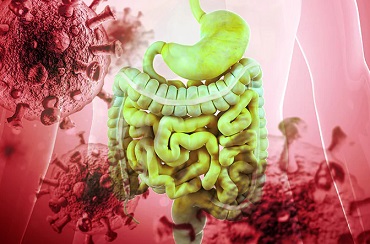Breaking News! Study Finds That SARS-CoV-2 Mpro Is Able To Induce LPCAT3 Cleavage, Providing An Explanation For Gastrointestinal Manifestations!
Thailand Medical News Team Aug 07, 2023 2 years, 6 months, 2 weeks, 4 days, 9 hours, 17 minutes ago
COVID-19 News: The emergence of the severe acute respiratory syndrome coronavirus 2 (SARS-CoV-2) in late 2019 has led to a global pandemic, causing millions of infections and fatalities worldwide. Beyond the typical respiratory symptoms, many COVID-19 patients have also presented with gastrointestinal manifestations, including diarrhea, nausea, and vomiting as covred in various past studies and
COVID-19 News reports.

Similar gastrointestinal symptoms have been observed in patients infected with other coronaviruses, such as Middle East respiratory syndrome coronavirus (MERS-CoV) and porcine epidemic diarrhea virus (PEDV). However, the underlying mechanism of how coronaviruses induce gastrointestinal symptoms has remained elusive.
A consortium of researchers from Ocean University of China, Qingdao-China, Hainan University, Qingdao University-China, Shandong Foreign Trade Vocational College-China, and Hainan University-China has conducted a groundbreaking study to shed light on the enigmatic connection between the SARS-CoV-2 main protease (Mpro) and the cleavage of lysophosphatidylcholine acyltransferase 3 (LPCAT3), offering valuable insights into the pathogenesis of gastrointestinal manifestations in coronavirus diseases.
The Complexity of Coronaviruses
Coronaviruses belong to the Coronaviridae family and have a large single-stranded RNA genome with a unique replication strategy. The genome encodes several nonstructural and structural proteins, which play crucial roles in virus replication and pathogenesis. Among these proteins, the main protease (Mpro) plays a central role in cleaving viral polyproteins, enabling the maturation of nonstructural proteins (NSPs) essential for viral replication and infection. Various studies have highlighted the interaction between SARS-CoV-2 proteins and host proteins, indicating their potential role in modulating diverse biological processes.
Unraveling the Role of LPCAT3
Lysophosphatidylcholine acyltransferase 3 (LPCAT3) belongs to the membrane-bound O-acyltransferase (MBOAT) family of enzymes and is known to be critical for lipid metabolism and homeostasis. It exhibits broad substrate preferences, including lysophosphatidylcholine (lysoPC), lysophosphatidylethanolamine (lysoPE), and lysophosphatidylserine (lysoPS), and is widely expressed in tissues like the liver, intestine, and adipose tissue.
In the intestines, LPCAT3 plays a vital role in lipid absorption, contributing to the formation of glycerophospholipids through the Kennedy pathway and their subsequent maturation in the Lands' cycle.
Notably, LPCAT3 deficiency in the intestine has been linked to reduced lipid absorption, leading to decreased atherosclerogenic lipoproteins in circulation.
Furthermore, LPCAT3 knockdown in the liver has been shown to exacerbate endoplasmic reticulum (ER) stress and inflammation. This suggests that malabsorption and inflammation in the intestines may be implicated in severe diarrhea, a common gastrointestinal symptom observed in coronavirus diseases.
Exogenous SARS-CoV-2 Mpro Inducing LPCAT3 Cleavage<
;br />
In their investigation, the research team made a startling discovery. During the analysis of cellular lysates from SARS-CoV-2-infected cells, an unexpected band appeared in the region corresponding to LPCAT3.
This finding hinted at the possibility of LPCAT3 cleavage during SARS-CoV-2 infection.
To confirm this hypothesis, the study team introduced a Flag-tagged SARS-CoV-2 Mpro into human embryonic kidney (HEK293T) cells.
Surprisingly, the cleaved form of LPCAT3 was clearly evident in the presence of exogenous SARS-CoV-2 Mpro, establishing a direct link between Mpro and LPCAT3 cleavage.
Interestingly, the cleavage of LPCAT3 by SARS-CoV-2 Mpro was not restricted to specific cell types.
The researchers observed this cleavage phenomenon in multiple cell lines, including human colorectal cancer-derived HCT116 cells, human cervical cancer-derived HeLa cells, human hepatocellular cancer-derived HuH-7 cells, and human breast cancer-derived MCF-7 cells. This indicates that the SARS-CoV-2 Mpro-induced LPCAT3 cleavage is independent of cell type.
Implications for Gastrointestinal Symptoms in Coronavirus Diseases
The finding that LPCAT3 cleavage is induced by Mpro in viruses causing gastrointestinal symptoms, such as PEDV and MERS-CoV, but not in viruses causing mild symptoms, like HCoV-HKU1 and HCoV-OC43, raises intriguing possibilities. The researchers postulate that Mpro-induced LPCAT3 cleavage may contribute to the gastrointestinal symptoms observed in coronavirus diseases, especially severe diarrhea.
As LPCAT3 is critical for lipid absorption in the intestines, its cleavage by Mpro could lead to malabsorption, thereby triggering gastrointestinal symptoms during coronavirus infection. Notably, Mpro-induced LPCAT3 cleavage was shown to be independent of the catalytic activity of Mpro. This suggests that other factors and regulatory mechanisms may be involved in mediating this cleavage event.
The Significance of ER Stress Response in Coronavirus Infections
The researchers also highlighted the importance of the ER stress response in coronavirus infections. Viral infections can induce ER stress through various mechanisms, such as inaccurate protein synthesis, amino acid depletion, and improper protein transport. ER stress can modulate multiple signaling pathways, leading to cell survival or death. Notably, LPCAT3 deficiency has been shown to promote ER stress, and Mpro-induced LPCAT3 cleavage was found to enhance the expression of ER stress biomarkers, CHOP and GRP78.
The Potential Therapeutic Implications
The discovery of Mpro-induced LPCAT3 cleavage as a potential driver of gastrointestinal symptoms in coronavirus diseases opens up new avenues for therapeutic interventions. Understanding the molecular mechanism behind LPCAT3 cleavage may facilitate the development of targeted therapies to manage gastrointestinal manifestations in COVID-19 and other coronavirus infections.
Conclusion
The comprehensive study by a consortium of researchers has unraveled a significant connection between the SARS-CoV-2 main protease (Mpro) and the cleavage of LPCAT3, shedding light on the pathogenesis of gastrointestinal manifestations in coronavirus diseases. The findings provide crucial insights into the complex interplay between viral proteins and host factors, furthering our understanding of the diverse clinical symptoms observed during coronavirus infections.
The study findings were published in the peer reviewed journal: Viruses.
https://www.mdpi.com/1999-4915/15/8/1696
For the latest
COVID-19 News, keep on logging to Thailand Medical News.
